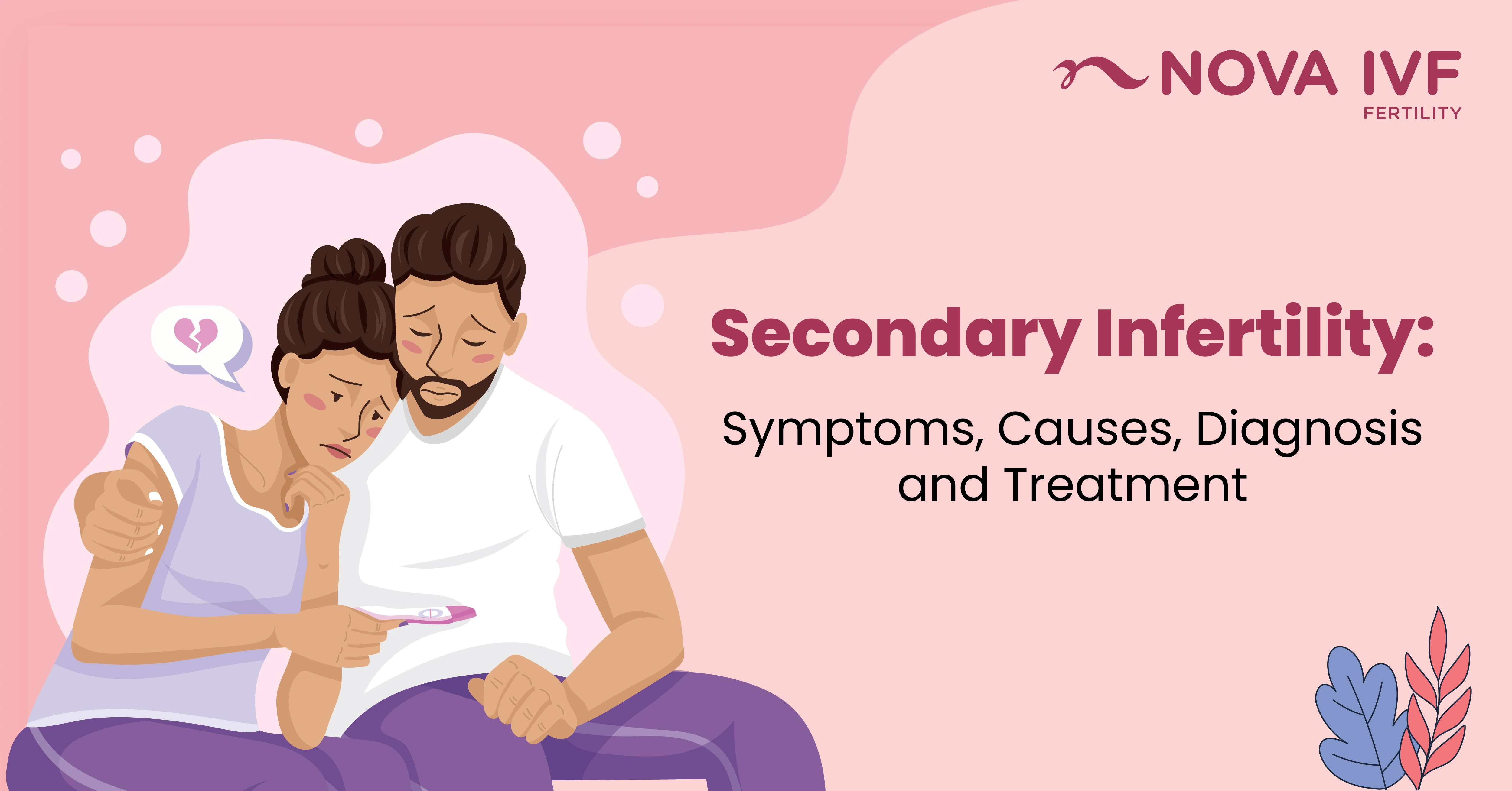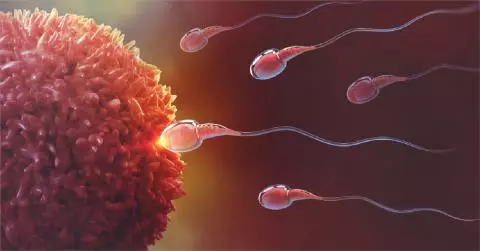Secondary Infertility

Secondary Infertility
If you’ve been trying to conceive for a while and are seeing no results, chances are that you might be dealing with infertility. As a layperson, you might not know much about infertility except for a general definition. However, there are various kinds of infertility that are caused due to varying reasons. Secondary infertility is one such condition. If you don’t know what dealing with secondary infertility entails, continue reading to learn everything you need about this condition.
What is Secondary Infertility?
Secondary infertility refers to the condition wherein you are unable to conceive or remain pregnant up to full term after you have already given birth previously. In order to be diagnosed with secondary infertility, you must have given birth previously without relying on fertility medications or treatments, including in-vitro fertilisation (IVF). Normally, a medical professional will diagnose you with secondary infertility after a couple of tries to get pregnant over the course of six months to a year. Although you might be familiar with primary infertility (i.e., not being able to conceive at all), secondary infertility is equally common.
What Causes Secondary Infertility?
Secondary infertility affects one or both partners. While there are cases where there is no discernible cause of secondary infertility, often it occurs due to multiple factors. The assigned sex and other unknown reasons are considered to be equally responsible for secondary infertility. Some of the more common causes of secondary infertility are as follows:
- Presence of impaired sperm or eggs
- Age
- Complications from a previous pregnancy
- Complications from a medical procedure or surgery
- An increase in Body Mass Index or weight
- Taking medications
- Medical conditions
- Sexually Transmitted Infections (STIs)
- Lifestyle factors like smoking or alcohol consumption
What are the Causes for Secondary Infertility in Females and Assigned Female at Birth (AFABs)?
Causes of secondary infertility in women and people assigned female at birth include issues like egg quality, structural problems in the uterus, health conditions, and lifestyle factors. Each of these causes is elaborated upon in detail below:
Issues with Egg Quality or Quantity:
Women and AFAB people are born with a limited number of eggs. They’re also unable to produce new eggs. As women and AFAB people reach their 40s, the number of eggs in their ovaries reduces. The residual eggs have a high chance of bearing chromosomal defects. Apart from age, a woman or AFAB person’s eggs may be of poor quality or lower numbers due to autoimmune conditions, genetic conditions, prior surgery, or radiation.
Structural Issues:
If you undergo surgery or an infection of sorts, it can cause damage to areas of your fallopian tubes or uterus. Your fallopian tube is instrumental in helping you conceive since it carries the egg to your uterus. If you contract an infection like chlamydia, gonorrhoea, or pelvic inflammatory disease, your fallopian tubes can get blocked. Along similar lines, certain medical conditions can affect your uterus and contribute to secondary infertility. An example is the scarring caused by procedures like dilation and curettage or a C-section delivery. Uterine fibroids and polyps can also act as blockages in your uterus and prevent a pregnancy.
Polycystic Ovary Syndrome (PCOS):
Polycystic Ovary Syndrome is a hormonal condition that is responsible for irregular and infrequent periods. If a person is suffering from PCOS, they might not ovulate regularly and can have difficulty conceiving.
Endometriosis:
Endometriosis is a condition wherein the tissue that would normally grow inside the uterus grows in one of the ovaries or other body parts. Although endometriosis occurs commonly, it doesn’t always cause infertility.
Lifestyle and Weight:
In some people, weight gain can cause ovarian dysfunction. Additionally, medications used to treat certain conditions can also cause infertility. Lifestyle choices like smoking cigarettes or drinking alcohol can also affect ovulation and conception.
What are the causes of secondary infertility in Males and Assigned Males at Birth (AMABs)?
Causes of infertility in men and people assigned male at birth include issues with hormone levels, medical conditions, and lifestyle factors. Again, the causes are explained in detail below:
Low Testosterone Level:
Testosterone is a hormone that plays a vital role in the production of sperm. Levels of testosterone can fall due to a range of reasons, from ageing and testicular injury to certain medical conditions such as:
- Thyroid diseases
- Genital infections
- Tuberculosis
- Diabetes
- Mumps
- Blood diseases
- Smallpox
- Benign tumours
- Myocardial infarction (heart attack)
- Emotional stress
- Stroke
- Coma
- Respiratory failure
- Burns
- Congestive heart failure
- Sepsis
The official medical term for low levels of testosterone is hypogonadism. Studies have shown that 2% of all men and AMABs suffer from low testosterone. The condition becomes even more common once men and AMABs reach 40 years of age.
Testicular Varicocele
Testicular Variocele is a condition wherein the veins of your scrotum or the skin of the sack encasing your testicles enlarge. This condition is a common cause of low sperm production and infertility in men and AMAB people.
Poor-quality Semen
Semen is the liquid that carries the sperm necessary for conception. After men and AMAB people turn 40, the quality of their semen tends to decline, causing fertility issues.
Low Sperm Count
According to most healthcare providers, a count of 15 million sperm per millilitre of semen is considered to be low. This condition, of low sperm count, is known as oligospermia.
Enlargement or Removal of Prostate
If a male or AMAB person suffers from an enlarged prostate, they can experience abnormal ejaculation. If your doctor removes your prostate due to cancer or other diseases, your semen may flow backwards. Such issues impede conception.
Drugs Affecting Sperm Count and Quality
Certain drugs, like antibiotics or medication that treats high blood pressure, can affect sperm quality. Treatments for the following diseases usually affect the quality of your sperm:
- Prostate cancer
- Fungal infections
- Urinary tract infections
- Ulcerative colitis
- Arthritis
- Gout
- Pain
- Various types of cancer
- Seizures
- Schizophrenia
Lifestyle Factors
A few specific lifestyle parameters, like exposure to sperm-damaging chemicals, can lead to infertility. A few lifestyle and chemical factors are:
- Natural lubricants like oils and petroleum jelly that can damage sperm.
- Exposure to pesticides, industrial chemicals, lead, and excessive heat can negatively impact fertility.
- Gaining substantial weight can lead to a decrease in the testosterone levels and elevate oestrogen levels in the body.
What are the Symptoms of Secondary Infertility?
The primary sign of secondary infertility is the inability to conceive after having had one or more than one biological kids. If your age is less than 35 years, you have been trying to conceive for more than 12 months, a medical professional might diagnose you with secondary infertility. By the term ‘trying to conceive,’ medical professionals generally refer to having regular unprotected sexual intercourse. However, if you are older than 35 years of age, your healthcare provider may diagnose you with secondary infertility even after six months of regular and unprotected sex.
Who is at Risk for Secondary Infertility and How Can it Be Diagnosed?
People who have had the following are at a higher risk for secondary infertility:
- Pelvic inflammatory disease (PID) or other sexually transmitted infections.
- Irregular menstrual cycles
- Miscarriages
- Hormonal imbalances
- Low sperm count
If you suspect you might be dealing with secondary infertility, you should schedule an exam with your healthcare provider, reproductive specialist, or urologist. One of the best ways to treat it is to diagnose it as early as possible. To diagnose you, your healthcare provider will:
- Go through your medical history to understand if anything has changed since your last pregnancy.
- Discuss your menstrual cycle to understand if you’re ovulating and producing eggs as needed.
- Evaluate if certain medical conditions may be affecting your sperm count or quality.
Your healthcare provider may also ask you to undergo certain tests to confirm their diagnosis. Some of these tests are:
- Semen analysis
- Blood tests to check your hormone levels.
- A transvaginal ultrasound
- A hysterosalpingogram (i.e., an x-ray that allows a doctor to see your uterus and fallopian tubes).
What is the Treatment of Secondary Infertility?
While the two differ in terms of definition and causes, the treatments for primary and secondary infertility are mostly the same. They are as follows:
- Medications: Secondary infertility can be treated with the help of medications like clomiphene and letrozole by inducing ovulation in people who have trouble doing so regularly.
- Intrauterine Insemination: The procedure involves placing sperm inside the uterus to increase the odds of fertilisation. Often, sperm donors are used to successfully carry out the procedure.
- In-vitro Fertilisation (IVF): IVF is a complex process that involves obtaining the eggs from ovaries; the eggs are then combined manually with the sperm in a laboratory.
- Surgery: Surgery can be useful to repair uterine complications such as removing scar tissue, fibroids, or polyps. It can also be used to repair testicular varicocele.
Now that you know more about secondary infertility meaning, causes, symptoms, and treatments, keep an eye on your reproductive health. Make sure to get regular checkups to ensure that you can conceive without any issues. However, in case you do face infertility issues, there are medical solutions that can help you create the family you’ve always envisioned.
FAQs
Q. Can secondary infertility be corrected?
A. Yes, secondary infertility can be corrected. As soon as you suspect that you might be dealing with fertility issues, visit your healthcare providers to get started on a treatment plan at the earliest.
Q. Can you get pregnant if you have secondary infertility?
A. Yes, if treated correctly, secondary infertility does not stop you from conceiving once more.
Q. Can secondary infertility impact you emotionally?
A. Yes, secondary infertility can be physically and mentally exhausting. It can make you feel isolated, helpless, and confused. It can also cause strain between partners. However, you can seek help from a mental health professional or relationship counsellor to manage the stress of secondary infertility while you get treatment.
 Infertility Counselling
Infertility Counselling Female Infertility Treatment
Female Infertility Treatment Andrology Treatment
Andrology Treatment Fertility Enhancing Surgeries - Female
Fertility Enhancing Surgeries - Female Fertility Enhancing Surgeries - Male
Fertility Enhancing Surgeries - Male Endoscopy Treatment
Endoscopy Treatment IUI Treatment
IUI Treatment IVF Treatment
IVF Treatment ICSI Treatment
ICSI Treatment Advanced IVF Solutions
Advanced IVF Solutions Embryology
Embryology Vitrification Egg, Embryo, Sperm Freezing
Vitrification Egg, Embryo, Sperm Freezing Preimplantation Genetic Testing (PGT)
Preimplantation Genetic Testing (PGT) Donation Program Embryo / Egg / Sperm
Donation Program Embryo / Egg / Sperm Self-cycleTM IVF
Self-cycleTM IVF

 Self-cycleTM IVF
Self-cycleTM IVF










